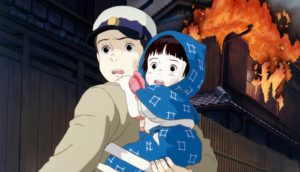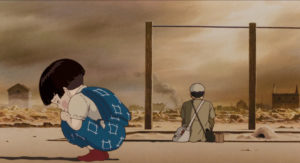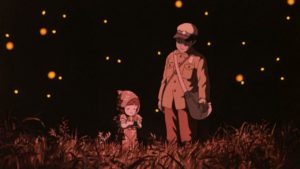Incluvie Foundation Gala - Learn More
'Grave of the Fireflies' is a Brutal, Heartbreaking Story of War
What seems like such a simple story of survival is so much more than that—it’s a story of family, and of war, and of destruction. It’s painful to watch, but not in a bad way. It makes its audience reflect on their own actions, and in how they are complicit in the sufferings of others as the adults in this film are. Grave of the Fireflies does not hold back from being heartbreaking, and it shouldn’t. It tells a message that needs to be heard decades after the war, and a story that cannot be forgotten by history.
Grave of the Fireflies (1988)


Grave of the Fireflies, from the legendary Studio Ghibli and directed by Isao Takahata, follows a brother, Seita, and his younger sister, Setsuko, living in Japan at the end of World War II. After their mother is killed in an air raid, the now orphaned pair struggles to survive in a harsh, unforgiving world. Heartbreaking yet beautifully crafted, Grave of the Fireflies is a brutal look at the tragedies of war and the pain of having to grow up too fast.

Grave of the Fireflies is one of the most memorable and effective films I’ve seen in a long time. For days after first viewing it, I found myself constantly thinking about the heartbreak I experienced watching the film. Though the real heartache doesn’t come until the end, the story is grim from the beginning. Told in a flashback after Seita dies alone in a train station, the film goes on to become even more devastating than its shocking first scene.
What makes Grave of the Fireflies so special is the relationship between Seita and Setsuko. The pair only have each other, and, after enduring enough abuse from their aunt who initially takes them in, decide that they can make it work on their own without anyone’s help. Reality soon hits them—surviving, especially as two children with little money to their name, takes a lot more than determination. Despite how many times he falls, Seita always picks himself back up—until he can’t anymore. His resolve to take care of his younger sister at any cost is admirable and heart wrenching—as an audience member, we are aware that he will not be able to continue doing this forever, but his love for his sister outshines everything else in his life.

Grave of the Fireflies shows the most painful and difficult aspects of war—the way in which it changes those who are thrust into it without a choice, and the families it destroys with its brutality and senseless violence. The film makes a bold statement, and doesn’t shy away from depicting the tragedies of wartime. Though the film was released in 1988, the story is still relevant today, and a similar story could be released now and be just as powerful and important. Grave of the Fireflies is a timeless tale that begs to be told but that few are brave enough to tell.
Despite knowing how the film would end from the start, Grave of the Fireflies still affected me powerfully. As Seita and Setsuko begin to starve, and as adults repeatedly turn their head to their obvious suffering, overwhelming sadness set in. Grave of the Fireflies shows the cruelty of the world, and isn’t afraid to pull on the audience’s heartstrings—it begs its audience to listen, to let these voices be heard, to not forget about those who are suffering. It’s breathtaking because of its sheer power and because of everything it has to say.

What seems like such a simple story of survival is so much more than that—it’s a story of family, and of war, and of destruction. It’s painful to watch, but not in a bad way. It makes its audience reflect on their own actions, and in how they are complicit in the sufferings of others as the adults in this film are. Grave of the Fireflies does not hold back from being heartbreaking, and it shouldn’t. It tells a message that needs to be heard decades after the war, and a story that cannot be forgotten by history.
More to explore
By Same Author
Related lists created by the same author
By General Category
Related movie/TV/List/Topic




